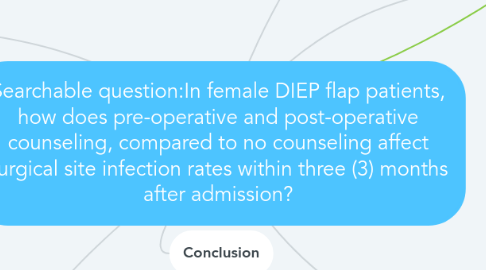Searchable question:In female DIEP flap patients, how does pre-operative and post-operative counseling, compared to no counseling affect surgical site infection rates within three (3) months after admission?
by Ali Nicolaisen

1. It can be deduced that women have better outcomes when psychological health is placed as a priority, this may have an impact on infections due to the body image aspect.
2. Functionality
2.1. Women may lose functionality after breast reconstruction
2.2. Post-operative rehabilitation is recommended for those with sufficient functionality and are unable to perform ADL's.
3. Decision-Making
3.1. Nurses should assist women in the decision-making process, regardless of age.
3.1.1. Women reported better psychological outcomes when they felt they were more involved in the decision making process of breast reconstruction.
4. Conclusion
5. Psychology
5.1. Counseling was found to be beneficial pre-operatively and post-operatively in older women who had breast surgery. Provides psychosocial support outside the hospital setting.
5.2. Women may experience sexual dissatisfaction related to body image after breast reconstruction and it is recommended they seek psychological help.
5.2.1. Decreased psychological health may affect patient's ability for self care after surgery
5.3. Most women recover from the psychological distress caused by surgery.
6. Wound infections
6.1. Wound infections are common in breast reconstruction surgery, regardless of the approach.
7. References
7.1. Crane-Okada, R., Freeman, E., Kiger, H., Ross, M., Elashoff, D., Deacon, L., & Giuliano, A. E. (2011). Senior Peer Counseling by Telephone for Psychosocial Support After Breast Cancer Surgery: Effects at Six Months. Oncology Nursing Forum,39(1), 78-89. doi:10.1188/12.onf.78-89 Gopie, J. P., Kuile, M. M., Timman, R., Mureau, M. A., & Tibben, A. (2013). Impact of delayed implant and DIEP flap breast reconstruction on body image and sexual satisfaction: A prospective follow-up study. Psycho-Oncology,23(1), 100-107. doi:10.1002/pon.3377 Hall, J. C., & Hall, J. L. (2004). The measurement of wound infection after breast surgery. The Breast Journal, 10(5), 412-415. doi:10.1111/j.1075-122x.2004.21401.x Kadmon, I., Noy, S., Billig, A., & Tzur, T. (2016). Decision-Making Styles and Levels of Involvement Concerning Breast Reconstructive Surgery: An Israeli Study. Oncology Nursing Forum,43(1). doi:10.1188/16.onf.e1-e7 Nelson, J. A., Lee, I. T., & Disa, J. J. (2018). The Functional Impact of Breast Reconstruction. Plastic and Reconstructive Surgery - Global Open,6(3). doi:10.1097/gox.0000000000001640 Timman, R., Gopie, J. P., Brinkman, J. N., Kleijne, A., Seynaeve, C., Menke- Pluymers, M. B. E., Mureau, M. A. M. (2017). Most women recover from psychological distress after postoperative complications following implant or DIEP flap breast reconstruction: A prospective long-term follow-up study. PLoS ONE, 12(3), 1–12. https://doiorg.uiulibrary.idm.oclc.org/10.1371/journal.pone.0174455



